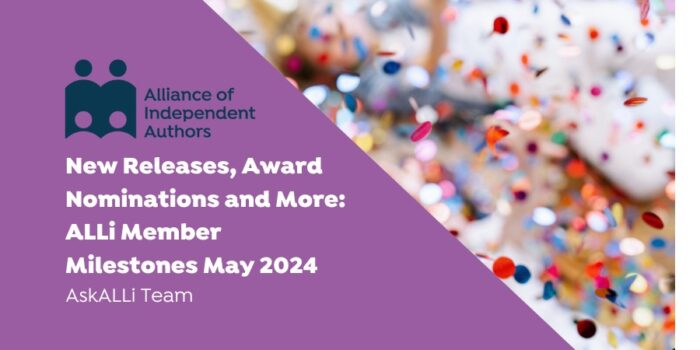As more and more self-publishing authors make a success of our endeavours, more agents and publishers come calling. But too often they come with a traditional publishing contract in hand. This fails to recognise that an indie author's situation is different to that of a tyro, unpublished author.
As self-publishers, we have built our readership and already have a following. Our e-rights are very valuable to us and we're not keen to bundle them with other rights. We expect publishers to understand that our situation is different — and to reflect this in their contractual terms and conditions.
Here are four questions that an indie should ask before signing any deal with an agent. (Please note, the first three questions pertain to signing with agents for English language rights; only the fourth to translation rights, which is a different proposition, requiring a different set of questions).
We'll have a blog post on that, and on questions to ask if you're considering signing directly with a publisher, soon.
1. Will my self-publishing income be free of agent's commission?
Many traditional agency clauses state that the agent will take a commission on all of an author’s income, including self-published work.
The reason given is that having a trade publisher increases an author’s self-published income — but this fails to acknowledge that the dynamic works both ways, and arguably these days, more in the opposite direction.
2. Can you get me a deal where I keep my e-rights?
Publishers want to bundle pbook and ebook rights. Of course they do. We want to separate them. Of course we do. We need an agent who can hold that line on our behalf.
3. Can you get me a territory-by-territory pbook deal?
Keeping our ebook rights and selling pbook rights on a territory by territory basis is generally the best indie strategy. Publishers want world English language rights for both ebooks and pbooks. Again, we need an agent who can negotiate well on our behalf.
4. What other territories do your authors sell in?
Many agencies use subagents for their foreign rights — which is fine, so long as it's an actual working relationship and not just a name on their website. How many foreign deals has this agency managed to close in recent years? If they're not good on that front, you may want to choose another agency.
(The Alliance of Independent Authors has a close relationship with Jennifer Custer of AM Heath, who has sold rights into 30 territories in recent years. Jennifer considers all members work for translation rights).
5. The most important question: WHY?
If an agent tells you something can't be yours, ask why. Agents and publishers may tell you things are not possible when what they mean is that's not how we usually do it. Don't be fobbed off with the answer that it's the “standard contract”. Traditional publishing contracts are unfavourable to authors and at the moment, everything is up for negotiation.
Any document from a publisher or agent is a starting point for negotiation. You may be very happy to hand over all rights, and trust your agent to get on with getting you the best possible deals, while you get on with writing. That's fine if that's what you want.
Or you may want changes or clarifications. That's fine too. Never sign anything until you know exactly what you're signing.
Finally, it's very important to position your agent to deliver the deal you want, right from the start.
Many writers don't understand that an agent may not go the extra mile in negotiating with a publisher, unless you've made it very clear that's what you expect. Their relationship with the publisher is very important to them. It is publishers' advances that pay agency's income. Understandably, an agent doesn't want to bite the hand that feeds them. And they know each other and work on other writer's work as well as yours.
If you want your agent to represent you well, you need to be clear yourself about what you want, what you're happy to negotiate about, and what is a deal-breaker for you.
As a baseline, the Alliance recommends indies hiring an agent to work on their behalf should start with offering print rights only, on a territory-by-territory basis only, retaining the right to self-publish, and to keep all earnings from self-published work.
Only move from there if a publisher is making it worth your while to do so.
Be very, very, VERY slow to give up your e-rights.
Finally, be clear yourself about what you want to offer before you even speak the first time. Ask for more time if you're not. During your conversation with them is not the time to be working out what you want.
If we are unclear, we can easily find ourselves swept along by people who are more experienced at negotiation than us.
GENERAL QUESTIONS
(as recommended by the Association of Author’s Representatives, Inc)
1. Is your agency a sole proprietorship? A partnership? A corporation?
2. Are you a member of the Association of Authors’ Representatives?
3. How long have you been in business as an agent?
4. How many people does your agency employ?
5. Of the total number of employees, how many are agents, as opposed to clerical workers?
6. Do you have specialists at your agency who handle movie and television rights? Foreign rights? Do you have sub-agents or corresponding agents overseas and in Hollywood?
7. Do you represent other authors in my area of interest?
8. Who in your agency will actually be handling my work? Will the other staff members be familiar with my work and the status of my business at your agency? Will you oversee or at least keep me apprized of the work that your agency is doing on my behalf?
9. Do you issue an agent-author contract? May I review a specimen copy? And my I review the language of the agency clause that appears in contracts you negotiate for your clients?
10. What is your approach to providing editorial input and career guidance for your clients or for me specifically?
11. How do you keep your clients informed of your activities on their behalf? Do you regularly send them copies of publishers’ rejection letters? Do you provide them with submission lists and rejection letters on request? Do you regularly, or upon request, send out updated activity reports?
12. Do you consult with your clients on any and all offers?
13. Some agencies sign subsidiary contracts on behalf of their clients to expedite processing. Do you?
14. What are your commissions for: 1) basic sales to U.S. publishers; 2) sales of movie and television rights; 3) audio and multimedia rights; 4) British and foreign translation rights?
15. What are your procedures and time-frames for processing and disbursing client funds? Do you keep different bank accounts separating author funds from agency revenue?
16. What are your policies about charging clients for expenses incurred by your agency? Will you list such expenses for me? Do you advance money for such expenses? Do you consult with your clients before advancing certain expenditures? Is there a ceiling on such expenses above which you feel you must consult with your clients?
17. How do you handle legal, accounting, public relations or similar professional services that fall outside the normal range of a literary agency’s function?
18. Do you issue 1099 tax forms at the end of each year? Do you also furnish clients upon request with a detailed account of their financial activity, such as gross income, commissions and other deductions, and net income, for the past year?
19. In the event of your death or disability, or the death or disability of the principal person running the agency, what provisions exist for continuing operation of my account, for the processing of money due to me, and for the handling of my books and editorial needs?
20. If we should part company, what is your policy about handling any unsold subsidiary rights to my work that were reserved to me under the original publishing contracts?
21. What are your expectations of me as your client?
22. Do you have a list of Do’s and Don’ts for your clients that will enable me to help you do your job better?





up to standard and thank you for visiting online casino agents for
Indonesia. Here we are here to have the funds for right of entry
for fans of sbobet casino who want to belong
to the international agent site Promosbobet.
The products offered are completely diverse and are definitely the best choice.
Derived from providers that have credibility and
have been proven to have the best predicate in serving their customers.
Providers as soon as Sbobet, Maxbet and many more.
As the best online casino and soccer gambling site in Indonesia.
We come up with the money for maximum relief as soon as
customer support that works online 24 full hours every day.
therefore members can operate whenever and wherever without fearing
to position the possibility of difficulties or confusion.
[…] including to an agent’s blog, and will be posting to others. In my searches, I came across this post about how indie authors should expect agents to protect their rights, which is directly relevant to these […]
THANKS
I have a training class that I am taping, having transcribed and then a professor with a history in this field has offered to take that transcript and move the text around, organize, etc to present back to me with his ideas on how to translate the class experience into a book. QUESTION – is he entitled to any “credit” as editor, co-author, etc? I respect him, there is no animosity and I don’t want to create any. So before we start this, I want to check on what credit someone would typically get in this situation.
Thanks!
Excellent advice. The world is changing, and the answers to these questions can tell an author whether an agent is changing with it, or praying it will go back to the “good old days” 🙂
Thank you Orna, for outlining this so clearly. I hope one day to be in the position to need this information. 🙂
Excellent and informative post, thanks, Orna
Great advice, Orna. I have my interrogation spotlight and poking stick at the ready.